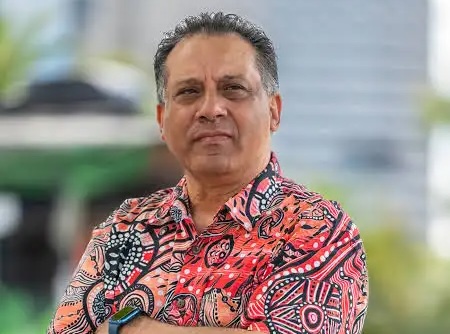The ancient drum and dance traditions of West Africa’s Wolof ethnic community are conserved by dedicated cultural stewards called guéwel, which literally means “circle.” As their name suggests, guéwel are responsible for bringing their communities together around them to collectively overcome personal and social challenges. Over the past two years, Mr. Lamine Sonko (a guéwel) and Adrian Hearn (an anthropologist) have been collaborating to apply this practice in presentations, conferences, and workshops around Melbourne.
From reducing anxiety and improving mood to enabling emotional release and group connection, the benefits of hand drumming are well known. One study of U.S. school children identifies drumming as “a therapeutic tool” because it is a “universal activity that builds upon a collectivistic aspect of diverse cultures and does not bear the stigma of therapy.”
While growing evidence suggests the need to fund and facilitate access to drumming workshops to improve psychological and social outcomes, how such workshops should be designed to maximise these benefits is less clear. Our work takes its cues from West Africa’s guéwel practitioners, who over centuries have refined drumming circles to maximise personal and community wellbeing.
A core principle of guéwel drum circles is “ko maat,” which means “completeness.” The term is not used in an abstract or general sense, but rather to generate specific experiences of collective belonging, purpose, and resilience. We incorporate this principle into our workshops by dividing the group into two semi-circles, each with a different yet complementary role. The first group claps simply and slowly by counting to two and repeating, and then the second group claps slightly faster to fit three beats into the same amount of time. The “one” of both groups is shared, while the other beats fall around each other in a pattern that at first may feel unfamiliar and “wrong,” but after a few seconds becomes comfortable and “right.” As the two groups relax and listen to each other, they learn that their resilience is rewarded with a sense of collective ko maat as the circle becomes unified and complete.
Related to ko maat is a guéwel practice called “yeuk yeuk” (embodied knowledge), which builds meaningful understanding through lived and physical experience. This involves teaching traditional rhythmic patterns that emphasise silence and space between beats. By using specific rhythms to communicate through sound, silence, movement, and feeling, yeuk yeuk is a powerful tool for nonverbal communication, fostering a collective understanding that transcends language and engages the whole body.
Lamine’s 13.12 project completes the guéwel circle in a performative way, enabling audiences to internalise ancient wisdom through a multi-sensory experience. It combines live music with projections and soundscapes to build a bridge between ancestral knowledge and emerging forms of intercultural engagement. The Cambridge Companion to Music in Australia includes a chapter that explores Lamine’s interdisciplinary art practice, which highlights the relevance and adaptability of guéwel traditions to diverse sociocultural settings.

Our collaboration to design and deliver drumming workshops in Melbourne results from our own distinct yet complementary life journeys. Lamine was born into one of Senegal’s most prominent guéwel families, which is entrusted with employing sacred practices to establish connections between people and their cultural and physical environments. Beginning in early childhood, his education was guided by elders through observation and participation in rituals and ceremonies including rhythmic, chant, and dance traditions. While he continues to maintain this traditional role, he also recognises the importance of exploring ways to adapt and apply this knowledge in broader cultural contexts.
Adrian, who is of English and Brazilian background, grew up in Madison, Wisconsin, where in the 1990s he was invited by a Native American Menominee community to join its weekly drumming ceremonies. This inspired a year of ethnographic study with guéwel families in Senegal and, since then, four years in Cuba as an apprentice of the African-descended batá drums. His Suns of Mercury initiative creates collaborative music and community development projects in Cuba, Brazil, and now with Lamine in Melbourne.
Applying our experiences to activities with young people, students, researchers, and others in drum circles is a natural extension of our lives’ journeys. These journeys have instilled respect for ancestral drumming traditions, insights into their benefits for personal and collective wellbeing, and a commitment to sharing these benefits with diverse communities in our chosen home of Melbourne. A key lesson has emerged along the way: the pursuit of ko maat is an ancient endeavour that does not require us to reinvent the wheel. Rather, we can put historically proven practices to use, such as those of guéwel, by simply completing the circle.





.png)